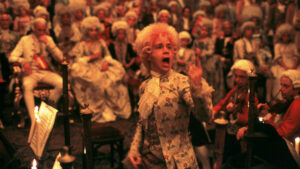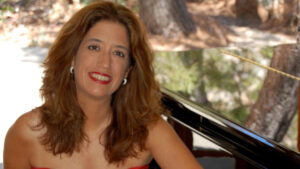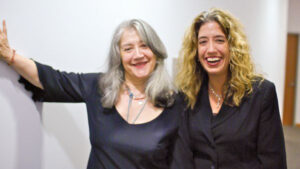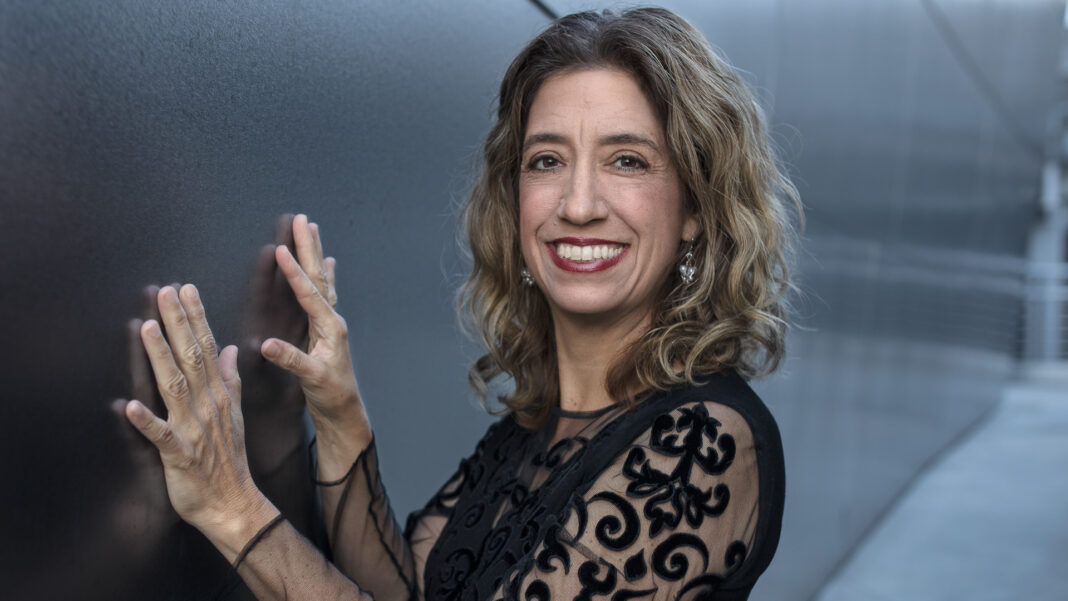“I love what I do and it’s a very specific thing that I do. Sometimes I have soloists saying, hey, that that must be kind of fun to do.” What Joanne Pearce Martin gets to do is a play a wide range of repertoire as the keyboardist with the Los Angeles Philharmonic. From contemporary classical music to chamber music to film scores to some of the most famous classical music there is.

On Tuesday she’ll be combining classical music and film as she is the featured soloist for Amadeus Live in Concert at the Hollywood Bowl. The 1984 film, based on Peter Shaffer’s play, won 8 Academy Awards including Best Actor for F. Murray Abraham, best director for Milos Forman and Best Picture.
The Los Angeles Philharmonic has already had live music screenings for Steven Spielberg’s West Side Story and also the original Back to the Future film.
But Amadeus is a completely different beast as I learned when I spoke earlier this week with Martin via Zoom. What follows are excerpts from our conversation that have been edited for length and clarity. If you want to see the full interview, please go to our YouTube channel.
Mozart said, “The music is not in the notes, but in the silence between.” What role does silence play in your appreciation of music and in the music you appreciate?
Wow. A very interesting opening statement because that’s a big thing of mine. You can’t even begin to appreciate the notes or digest them properly without the silence. This is something that I tell students when I’m coaching or doing masterclasses.
We’re in this world of overload. Everything is overload. I think when you hear young players sometimes right now, they don’t think about the rests as much as some of us used to. It’s something that I find important to pass on. For instance, in a cadenza, which is supposed to sound improvised in the first place, how can you ignore rests when you’re trying to be someone who is having a new thought in the moment? So that’s got to take a nanosecond. And for the listener to sit back and not only get ready for what’s coming next, but be able to digest what just happened. Music is just not as powerful without the silences in between.
The complete soundtrack for Amadeus, and I don’t know if this is fully reflective of what will be performed, shows the third movement of the Concerto for Two Pianos, the third movement of the Piano Concerto in E Flat, and the first and third movements of the Piano Concerto in D Minor. Does that accurately reflect what you’ll be performing?
Yes, there are parts of all of those things in the movie, but the emphasis is on the word parts. The biggest chunk would be in the middle movement of the big D minor that is the majority of the end credits of the film, ironically. But almost the entire development is cut out of it. You know, things that one has to do when they’re creating this cinematic experience.
If you don’t get to develop it the way you would if you were actually playing the piece in its totality, what are the challenges in being able to just jump into a section without what precedes it?

That’s a great question because as I was preparing for this, and I’m continuing to prepare the next few days, I suddenly started realizing that the experience of preparing to jump in like that and play these little snippets, it was exactly like preparing for my orchestral audition for the L.A. Phil.
It’s a strange kind of energy that’s different from what we’re used to, particularly as pianists, because we’re kind of presenting often these big works where it’s only us and we are in complete control of the structure of what happens and the pacing. So to suddenly have these constrictions takes a different kind of mental discipline.
In looking at whose recordings were used in the film, the piano soloists were Christian Zacharias, Ivan Moravec and there were two women who did the Concerto for Two Pianos. When you’re playing to a film, there is a certain pace at which those performances were done. How much you have to match that to stay in sync with the film?
You have to match it a lot with great precision in some places because in this film, quite a few times, the video will cut to Mozart’s hands at a piano. There’s a part in the E-flat Concerto last movement where it’s a little funny. I have to kind of fool around with it in a way rhythmically that I absolutely would not if I was playing the piece for real. When it comes to the recap there are Mozart’s hands on the screen. So it’s got to be dialed in exactly there. This is one of the things that our conductor, Sarah Hicks, and I were just discussing – moments like that and how to handle it.
Are there moments when guest artists come through either the Walt Disney Concert Hall or the Hollywood Bowl as soloists where you think I could do that?
I don’t know about I could do that. I mean, technically, I could do that or some of it or a lot of it, whatever you want to say. That’s how every player feels, I think, when someone comes. Sometimes the grass is greener on the other side. But no, I can’t say I even have great envy or feeling like that. We get to have world-class artists. When Martha Argerich came and played with us I could barely even speak. I have a great job. That’s what it comes down to.
Yuja, Wang is doing what I think is crazy in February, doing two cycles of all three Rachmaninoff piano concerti. As a pianist you must be thinking who in their right mind is going to do all three of those in three consecutive nights, over two weeks.
Yuja Wang, that’s who. It’s not going to be difficult for her. She’s insanely talented and I absolutely can see her doing this. It’ll be great.
Speaking of musicians like Martha Argerich and Yuja Wang. Artists like that are held up as examples for young music students to look at and be told if you practice hard enough, you could do that. It’s possible, but it’s unlikely. That’s like winning the lottery on a certain level. What I love about what you do is that seems tangible for people that you could potentially be good enough to be the keyboardist with a performing orchestra. What would you tell parents and students to sort of manage expectations and tell them are the best things about what you do and why that is something they should aspire to just as much as trying to travel the world and be Lang Lang?

That’s also a great question. Yes, we start out and maybe our parents say things like if you work hard, you can be Martha Argerich or Yuja Wang and you can get there. When I do masterclasses and talk to young people, one of the things that I say is all young pianists, we spend a lot of time in a room alone working hard on our scales and arpeggios that our teachers give us. We don’t do a lot of interacting, at least for a while, with other musicians.
What I like to stress is be open, be open to everything and anything musical and be open to other things in life that you think maybe you wouldn’t be doing. I’m talking mostly about genres of music.
Little did I know, for instance, playing things other than classical music with my older brother, who was a drummer, that was kind of like metronome work. I think because of that I have a pretty decent sense of rhythm. At the time I wouldn’t have thought this is helpful for when I auditioned to play with a major symphony orchestra. I never thought I’d be doing the job that I have now.
As the years went by I started to love chamber music and playing with others. While you’re playing you’re listening as much as you’re playing. You’re listening to how they breathe, how they phrase, comparing it to what you do yourself, reacting with what you do directly to them. All of those things are preparation to being a good all-around musician. I don’t care if you’re a soloist or a player in an orchestra like I am, being an all-around good musician is a very, very valuable thing. The most important thing you can do is to always be learning, always be listening, always be open to what’s out there, to round you out as a musician.
The late pianist Leon Fleisher said “Growing as a pianist gets more difficult every day.” Do you agree with him? And if you do, is there a way of overcoming that or is overcoming it a necessity?
I think overcoming the negative aspects of that is a necessity. I’m not sure if I’m interpreting it the way he meant it, but it’s easy to get inside your head a little too much as a performer. You get older and you start getting wiser. For me, I enjoy performing. I’m not going to say that I don’t get nervous. What I say is that I have a healthy dose of adrenaline when I perform. So I’m blessed to not have any kind of serious problem with nerves. I’m sympathetic to those who do, but I get excited. As I get older I learn different ways to manage my excitement.
But I the older I get, the more I find that every day is is a gift. In life in general it’s a real gift. So I try to look at music and life that way. Always open to learning. For me, I can’t say that gets harder. It gets more interesting. I just kind of take that day by day. But the bigger picture for me is that I’m grateful that I’m able to do it and I love it and can’t imagine my life without it.
To see our full interview with Joanne Pearce Martin, please go here.
Main Photo: Joanne Pearce Martin (Courtesy Los Angeles Philharmonic Association)










